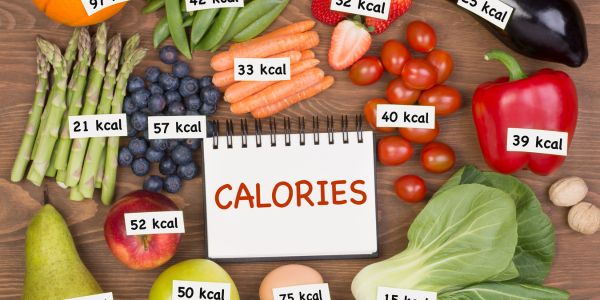What if I told you there are foods out there that could literally disappear into thin air, and no, I’m not talking about magic or Harry Potter spells. I’m talking about foods that contain almost zero calories.
These foods will help you feel fuller for longer without weighing your food or counting your calories. You’ll basically feel like a culinary Houdini.
So, keep reading to see the benefits of these 17 foods with almost zero calories.
Table of Contents
1. Cucumbers: 16 calories
Cucumbers are a refreshing and tasty addition to any meal. Not only do they add flavor, but they are also a great low-calorie option for those looking to stay fit and healthy. A single cucumber contains only 16 calories, making it a satisfying snack that won’t break the calorie bank.
Cucumbers are high in water content, keeping you hydrated and full for longer.
More importantly, cucumbers help you stick to your diet without sacrificing flavor. You can enjoy them sliced in a salad, blended in a smoothie, or simply as a refreshing snack.
2. Shirataki noodles: 3 calories
If you love noodles but also want to maintain a healthy diet, shirataki noodles are just 3 calories per 100 grams.
These low-calorie noodles are made from the root of the konjac plant, which means they are low in carbs, calories, and fat. Unlike traditional pasta, these noodles are gluten-free, which makes them a great option for people with celiac disease or gluten intolerance.
And they’re also high in fiber and can help you feel full for longer.
3. Black Coffee: 0 calories
If you’re looking for a low-calorie pick-me-up to start your day, black coffee is a delicious and energizing beverage with next to zero calories.
Plus, coffee is known to boost metabolism, curb appetite, and even improve cognitive function.
4. Watercress: 11 calories
Watercress is a leafy green vegetable you may have overlooked in the produce aisle.
That’s a mistake.
Watercress is packed with essential vitamins and minerals and only contains about 11 calories per 100 grams.
5. Lettuce: 15 calories
Lettuce is one of the most versatile and nutritious vegetables you can add to your diet, packed with essential nutrients like vitamins A and C, fiber, and other important minerals.
Whether you enjoy it as part of a salad or add it to a sandwich, there are plenty of ways to incorporate this healthy green into your daily meals. Plus, lettuce comes in various types and flavors, so you are sure to find one you love!
6. Spinach: 23 calories
This leafy green vegetable is incredibly versatile in terms of how it can be cooked and used in recipes. Plus, it’s jam-packed with nutrients to keep you feeling full and satisfied.
At just seven calories per cup, you can add spinach to your meals without worrying about overdoing it on the calorie count. Plus, spinach is a great source of fiber, iron, and vitamins A and C, making it a powerhouse food that can benefit your overall health.
7. Celery: 14 calories
Celery, often overlooked as a mere garnish for salads or Bloody Marys, is a nutritious powerhouse. Not only is it low in calories, with only about 10 calories per stalk, but it is also high in fiber and water content.
This means that it will fill you up and help keep you hydrated. Plus, celery is packed with vitamins K and C, potassium, and folate.
8. Broth: 22 calories
Broth is a fantastic low-calorie food that can offer a wealth of health benefits.
It’s tasty, nutritious, and satiating. Broth can help digestion, soothe inflammation, and boost your immune system.
Broth is also suitable for various diets, such as paleo, keto, and vegan.
9. Zucchini: 17 calories
With only about 17 calories per 100 grams, zucchini is the perfect sidekick in your weight loss journey. And it’s also loaded with nutrients, including vitamin C, fiber, and potassium.
Even better, zucchini is a versatile ingredient that you can use in countless ways to brighten your meals. You can grill, roast, or even turn it into delicious noodles. Yum!
10. Arugula: 25 calories
Arugula adds a distinct peppery flavor to your meals, with only 25 calories per cup.
Plus, arugula is packed with vitamins and minerals such as potassium, vitamin C, calcium, magnesium, and iron, making it a great all-around food choice.
11. Lemons: 29 calories
Lemons may be small, but they pack a powerful punch! They’re tangy and refreshing, contain 88% of the recommended daily value of vitamin C, and even have dietary fibers to keep you satiated.
A glass of lemon juice mixed with warm water on an empty stomach can improve digestion, boost your immune system, and energize you instantly.
12. Broccoli: 34 calories
Broccoli is more than just a vegetable on your dinner plate – it’s a powerhouse of health benefits that packs quite the nutritious punch. This small green veggie contains 148% of your necessary daily intake of vitamin C, plus it’s packed with vital nutrients such as vitamin K, fiber, and folate.
In fact, consuming broccoli has been linked to lowering your risk for various diseases, such as cancer, heart disease, and diabetes.
13. Watermelon: 30 calories
Watermelon has just 30 calories per 100 grams but also contains beneficial nutrients like vitamins A and C, potassium, and fiber. Even better: this refreshing fruit boasts a high water content, making it an excellent choice for staying hydrated.
14. Slim rice: 7.7 calories
Slim rice is made from konjac flour, a type of root vegetable high in fiber and provides a feeling of fullness.
With just 7.7 calories per 100 grams, slim rice takes the cake compared to Basmati rice at 350 calories and brown rice at 111 calories.
Slim rice is also gluten-free and has negligible carbohydrates, making it an ideal choice for low-carb or ketogenic diets. Additionally, slim rice is an excellent magnesium source, essential for heart and brain health.
15. Sugar-free Jello: 20 calories
Sugar-free jello is a delicious treat that is low in calories and sugar.
However, jello doesn’t have any nutrients or specific health benefits. It can only help you indulge your sweet tooth without falling off the weight loss wagon.
16. Bok choy: 12 calories
Bok choy has always had a solid reputation as a healthy vegetable, and it’s no surprise why. This leafy green is rich in antioxidants, which can help to reduce inflammation and support overall health.
Plus, it contains significant nutrients, such as:
- Vitamin C: 35% of the recommended daily value (RDV)
- Folate: 12% of the RDV
- Vitamin A: 17% of the RDV
- Vitamin K: 27% of the RDV
17. Tomatoes: 19 calories
Tomatoes are more than just a tasty addition to our daily diet – they’re also a nutrient-packed low-calorie food. Tomatoes are an excellent source of antioxidants, vitamins, and minerals, including vitamin C, potassium, and lycopene.
Lycopene, in particular, has been linked to a reduced risk of cancer, heart disease, and certain eye disorders. Plus, tomatoes are high in fiber, making them ideal for weight loss and healthy digestion.
Outro
So there you have it, 17 foods with nearly zero calories. That means you can eat them guilt-free and maybe even have room for dessert…or a glass of wine…or a cheeseburger.
Just kidding; I didn’t say that.
But seriously, incorporating these low-calorie foods into your diet is a great way to stay fit and healthy. And who knows, maybe you’ll fall in love with a new vegetable or fruit along the way.
Just don’t forget to balance it out with some whole grains and lean proteins. And, of course, never forget the importance of treating yourself every once in a while.
Cheers to healthy, delicious, and satisfying meals!
- 7 Exercises for Pregnant Women in the First Trimester: Safe and Effective - January 30, 2025
- Our equipment recommendations - October 30, 2024
- Here’s What Doing Cardio Every Day Does To Your Body - August 21, 2024

